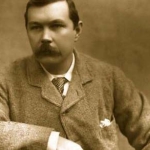Men of the Twenty-first
Up by the Chalk Pit Wood,
Weak with our wounds and our thirst,
After a day and a night.
god, shall we ever forget?
Beaten and broke in the fight,
But sticking it, sticking it yet,
Trying to hold the line,
Fainting and spent and done;
Always the thud and the whine,
Always the yell of the Hun.
Northumberland, Lancaster, York,
Durham and Somerset,
Fighting alone, worn to the bone,
But sticking it, sticking it yet.
Never a message of hope,
Never a word of cheer!
Fronting Hill 70’s shell-swept slope,
With the dull, dead plain in our rear;
Always the shriek of the shell,
Always the roar of the burst,
Always the tortures of Hell,
As waiting and wincing we cursed
Our luck, the guns, and the Boche.
When our Corporal shouted “Stand to!”
And I heard some one cry, “Clear the front for the Guards!”—
And the Guards came through.
Our throats they were parched and hot,
But Lord, if you’d heard the cheer,
Irish and Welsh and Scot,
Coldstream and Grenadier—
Two Brigades, if you please,
Dressing as straight as a hem.
We, we were down on our knees,
Praying for us and for them,
Praying with tear-wet cheek,
Praying with outstretched hand.
Lord! I could speak for a week,
But how could you understand?
How could your cheeks be wet?
Such feelin’s don’t come to you;
But how can me or my mates forget
When the Guards came through?
“Five yards left extend!”
It passed from rank to rank,
And line after line, with never a bend,
And a touch of the London swank.
A trifle of swank and dash,
Cool as a home parade,
Twinkle, glitter and flash,
Flinching never a shade,
With the shrapnel right in their face,
Doing their Hyde Park stunt,
Swinging along at an easy pace,
Arms at the trail, eyes front.
Man! it was great to see!
Man! it was fine to do!
It’s a cot, and hospital ward for me,
But I’ll tell them in Blighty wherever I be,
How the Guards came through.



















Comment form: